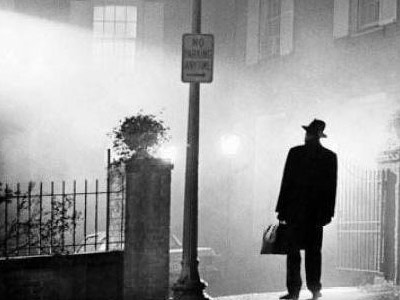The Exorcist (1973)

William Peter Blatty (A Shot in the Dark, The Ninth Configuration) provides the Oscar-winning screenplay, based on his best-selling 1971 horror novel, which in turn is purportedly partially based on a true-life exorcism performed in the late 1940s (reportedly the last officially sanctioned by the Catholic church) involving a demonic possession. Often at the top of lists of the scariest movies of all time, it will likely not be too scary to today’s younger viewers, who have become inured to gore and have seen plenty of films that have ripped off The Exorcist to the point where it will seem familiar. However, it does hold up well, thanks to the quality of the production and the effectiveness of its storytelling.
Despite being dismissed by some critics at the time of its release for being merely an exploitation flick, The Exorcist would garner 10 Academy Award nominations, unheard of for a horror film up to that point, and would go on to become a cultural phenomenon only rivaled by The Silence of the Lambs for the genre. Excellent casting and stylish (but not overly so) direction by William Friedkin (The Guardian, Rules of Engagement) who had just scored critical and commercial success with The French Connection, provide the believability factor required in what would otherwise be too far-fetched to effectively find scary. The characterizations are built slowly, deliberately, and when things begin to take hold in the horror department, the slow build up begins to reap great dividends.
The film starts with Max von Sydow (The Quiller Memorandum, Three Days of the Condor) as Father Merrin, leading an archaeological expedition into northern Iraq where artifacts of pagan origin are discovered which results in some unexplained calamities. Most of the rest of the events take place in Georgetown, where Ellen Burstyn (The Last Picture Show, The Wicker Man) plays Chris MacNeil, a film actress and single mother of a precocious girl named Regan (Blair, Roller Boogie). Regan has taken to playing with a found Ouija board which she claims really works, as she’s been talking to an unseen entity named Captain Howdy. Strange sounds begin to emanate from the house, especially from the attic, though the reasons behind them aren’t immediately clear. Soon, Regan begins to exhibit strange behavior, not only out of character, but also in a voice that doesn’t appear to be her own.
Her behavior becomes increasingly more vulgar and destructive, as doctors are stymied as to just how to treat her afflictions, both mental and physical. Jason Miller stars as a Jesuit priest named Father Karras (Miller, Light of Day), who is working as a psychologist when consulted to investigate the possibility of performing an exorcism, in which the priest performs rites to expel a demon (or make the patient believe she has been). But if an exorcism is to be performed, it’s going to take someone who still has the know-how to do it, which is where Father Merrin comes in.
Although the film tries to stay within the realm of the plausible (well, as much as supernatural stories can), and the build-up is subdued by modern standards, there’s still plenty of scares and shock value to be had for one of the most influential genre flicks of its kind. The old-school effects such as shaking beds and sliding furniture may not draw oohs and ahs nowadays, but they are believable within the context of the story, which does make them still potent enough to marvel at. Some horror fans looking for pure scares will likely grow impatient at the lack of early scares, and might even laugh at what audiences of yesteryear found nauseatingly terrifying. That’s the one downside to success through pushing the envelope of taste — eventually, all of the ideas will cycle through the flood of copycats that all try to be even more shocking and lurid, rendering the original work as progressively tamer.
Still, with good actors, a terrific script, a visionary director, and quality production on its side, The Exorcist has managed to entertain audiences for decades, while most other films in the genre are only for immediate consumption. Viewing the film today, one can only see how sad the state of the modern horror film has fallen, as believable actors are pushed aside in favor of hot babes and hunks, and the story is torn apart in order to inject a maximum amount of constant jump scares and unappealing visual stimuli. Spawning many poor imitations, including two terrible sequels, unfortunately the lessons learned from the success of the film wasn’t that audiences enjoyed a well-developed story so much as audiences enjoyed gross imagery and vulgarity. The Exorcist is, if nothing else, a reminder that storytelling is a powerful thing when done right, and no amount of booga-booga shock-scares and superficial music video style editing can make up for.
— Re-released into theaters in 2000 as The Exorcist: The Version You’ve Never Seen, which featured over 10-minutes of previously excised footage, a few trims, and enhanced effects and surround sound.
— Followed by two sequels, Exorcist II: The Heretic (1977) and The Exorcist III (1990). An attempt at a prequel featuring Father Merrin resulted in two films released from the same material, the re-tooled Renny Harlin version coming to theaters first as Exorcist: The Beginning (2004), and the original Paul Schrader attempt the following year as Dominion: Prequel to The Exorcist (2005).
Qwipster’s rating: A+
MPAA Rated: R for strong language and disturbing images
Running time: 122 min. (132 min. Director’s Cut)
Cast: Ellen Burstyn, Linda Blair, Jason Miller, Max von Sydow, Lee J. Cobb, Kitty Winn, Jack MacGowan, William O’Malley, Barton Heyman
Director: William Friedkin
Screenplay: William Peter Blatty
